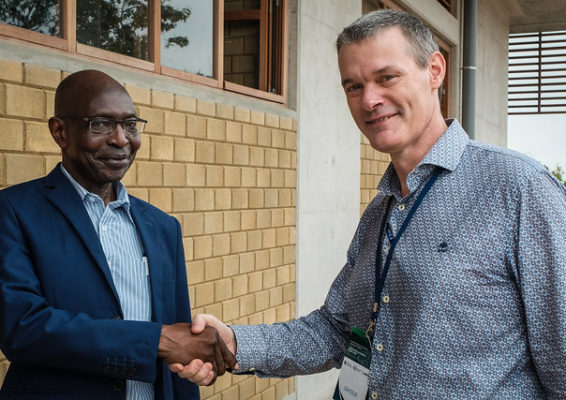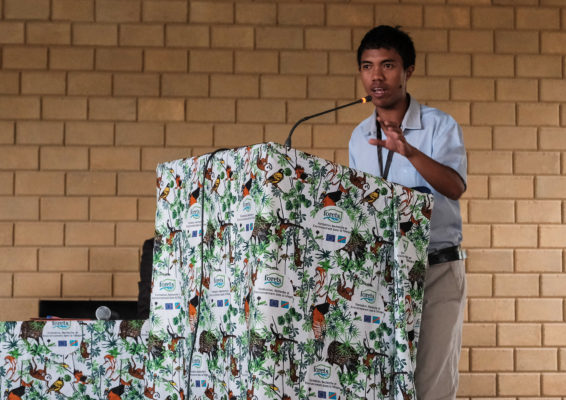For young people in sub-Saharan Africa, studying in Europe or the United States is an aspiration within reach of only a privileged few — those with adequate financial resources or the tenacity to prevail over grueling admission requirements, lengthy visa applications and excruciating scholarship qualifications.
Despite the obstacles, getting an education in the Global North is an attractive investment for many. Higher quality education, better reputation, colonial legacy or social biases — whatever the reason might be, for some students it is worth more than a local equivalent.
And for those students pursuing a career in academia, an education from a school in the North can be the only way in. Currently, universities in sub-Saharan Africa produce less than 1 percent of the global research output, and contribute to less than 1 percent of the global expenditure on research and development, according to the World Bank. Given the availability of research grants, facility to publish in international journals and diversity of potential collaborative agreements, it is not surprising that promising African scholars seek an affiliation within the North.
However, the picture is slowly changing, and as certain universities on the continent are improving their academic performance and reputation, African students are now looking for regional alternatives. A 2018 report by Campus France, for example, shows that while Europe remains the top destination for African students (49 percent), it is gradually losing ground as 20 percent of students now choose to study in Africa — mainly in South Africa, Ghana, Tunisia and Morocco.
And even if overall output is still very low, Africa has the fastest growing number of scientific publications in the world: 38.6 percent over a five-year period from 2012 to 2016. The number of African authors also grew at an equally astounding rate of 43 percent over that period, according to Elsevier.
WHAT ABOUT FORESTS?
The forestry sector is no exception to these trends. For many years, the world’s top scholars on tropical forests have come from northern countries, but there is a growing emphasis on building local expertise and bringing fresh perspectives to the global academic community.
“National experts can add valuable knowledge of the local conditions, constraints and political economy around forest resources,” says Robert Nasi, director general of the Center for International Forestry Research (CIFOR). “And there may be an intrinsic motivation to better use these resources to support local development; all they need is support to develop such expertise.”
With this aim, CIFOR’s project FORETS (Formation, Recherche et Environnement dans la Tshopo). sponsors an innovative master’s program in sustainable forest management at the University of Kisangani (UNIKIS) in the Democratic Republic of the Congo (DRC). Financed by the European Union, this program attracts top-notch professors from all over the world who travel to Kisangani once a year to co-teach a crash course with a Congolese counterpart. Students benefit from the visiting instructors, studying a single subject and taking exams within two weeks.
“Our system pairs two professors, one from DRC and one from abroad, both specialists in a specific topic, and together they plan, organize, instruct and evaluate a module,” explains Paolo Cerutti, senior scientist at CIFOR. “This gives students a global perspective and access to well-known scholars, while strengthening the capacities of UNIKIS’ faculty members.”
This innovative education model also results in cooperation beyond the classroom. Since CIFOR and UNIKIS started working together over a decade ago, dozens of papers have been co-authored by scientists from both institutions.
LOOKING SOUTH
FORETS is also facilitating more and more collaborations between African universities. As the African academic landscape becomes more dynamic, there are growing opportunities for new paradigms, such as South-South cooperation.


“Sometimes we look for expertise in northern scientific institutions, while it can be found right here in Africa,” says Pionus Katuala, dean of the Faculty of Sciences at UNIKIS. “This is why we are developing intra-continental partnerships to promote more exchanges and mobility of students and faculty, and the development of joint research projects that can address common challenges.”
“Madagascar and DRC, for instance, have a lot to learn from each other on sustainable forest management,” adds Manitra Razafintsalama, a lecturer and researcher on Environment and Forestry at the Graduate School of Agronomic Sciences of the University of Antananarivo, who is involved in an academic cooperation project with UNIKIS. In his view, Malagasy students and researchers have a lot to learn from what is happening in the Congo Basin. “They have different models here — for example, we don’t have forest concessions in Madagascar.”
“We don’t have tropical forests in Namibia,” says Carlos Dewasseige, professor at the Namibia University of Science and Technology (NUST). “However, our university works in remote sensing and information systems that could be useful to monitor land use changes and deforestation in Central Africa. This is why we are seeking to increase our collaboration with UNIKIS.”
FORETS and UNIKIS are not alone in this quest. The African Research Universities Alliance, for example, enhances research collaborations in areas that are crucial for Africa’s sustainable development. The Intra-Africa Academic Mobility Scheme, backed by the African Union and the European Union, also aims to improve the quality of higher education in Africa through mobility and exchanges of practices, including in the forestry sector.
“The future of tropical forestry needs local knowledge and expertise and investing in the development of Africa’s human capital is the only way to reach that goal,” Cerutti said.
We want you to share Forests News content, which is licensed under Creative Commons Attribution-NonCommercial-ShareAlike 4.0 International (CC BY-NC-SA 4.0). This means you are free to redistribute our material for non-commercial purposes. All we ask is that you give Forests News appropriate credit and link to the original Forests News content, indicate if changes were made, and distribute your contributions under the same Creative Commons license. You must notify Forests News if you repost, reprint or reuse our materials by contacting forestsnews@cifor-icraf.org.